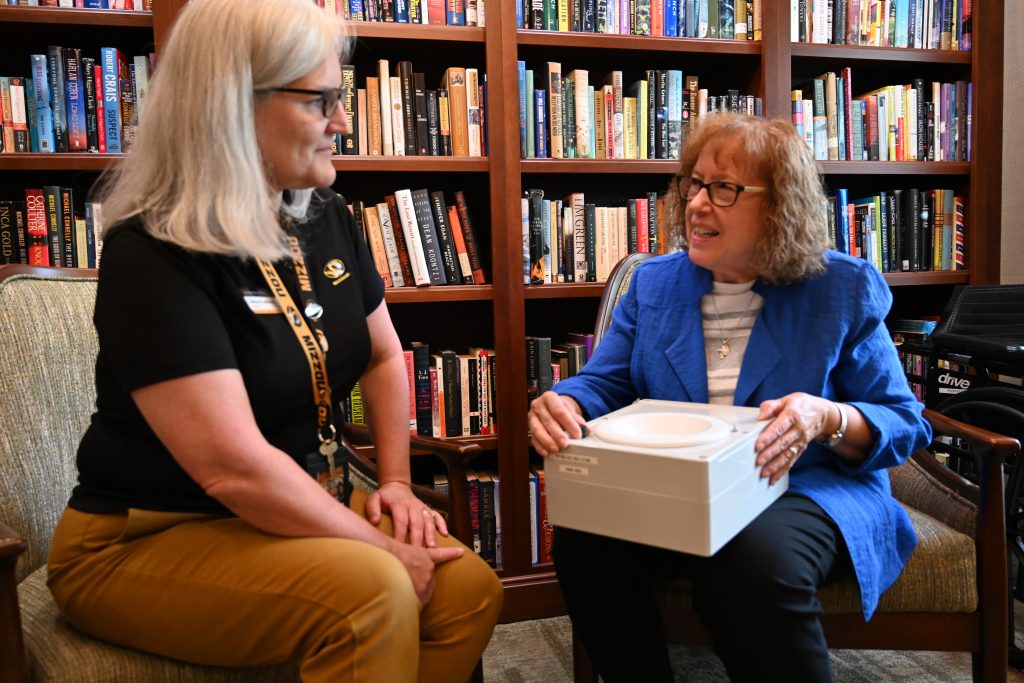We’re seeking exceptional faculty to move Mizzou Forward in Mobile Health (mHealth) by leveraging existing institutional strengths and addressing national health and scientific priority areas through innovation and collaboration. To further interdisciplinary collaboration, the university will consider faculty candidates in several areas of research.
Mobile Health
Research Areas
Incoming faculty will build on existing strengths in mHealth/Digital Health, including interdisciplinary collaborations across psychology, education, engineering, nursing, health sciences, social work, human development & family science, communication, statistics, and medicine, with the goal to serve as a one-stop resource that will provide software, sensing devices, and advanced data management and analysis services to researchers across campus to apply this methodology to study populations relevant to their own research questions. Our mHealth efforts are specifically focused on goals, outcomes, activities and workflows of people, families, communities – as well as nurses and other allied health professionals – to improve health and wellbeing.
For example, specific mHealth projects at the Sinclair School of Nursing (SSON) include mobile app development for clinical decision support in post-acute care and community settings; medication adherence for persons with a chronic illness; telehealth coaching coupled with mobile and wearable devices for care coordination to support healthy aging; and dashboard visualizations that integrate data from multiple devices to understand daily living patterns.
As another example, specific mHealth projects conducted through the collaboration of the Personality and Emotions Lab (College of A&S) and the Distributed and Intelligent Computing Lab (College of Engineering) include mobile app development (the TigerAware software platform), integration of external and smartphone sensors with mobile apps, collecting data on emotions, motivations, and substance use in daily life, and using advanced analytic techniques (e.g., multilevel modeling, machine learning) on large data sets collected through apps and sensors to inform decision-making and prevention of health problems.
At left: Dr. Marjorie Skubic with a nursing faculty member at Tiger Place, where they’ve installed health monitoring sensors from the Center 2 Stream Healthcare in Place.

Why Mobile Health at Mizzou?
Some of the resources available to support researchers include:
- Precision START laboratory (Smart Technologies and Applications for Rapid Translation) was created to overcome common barriers that prevent timely use of consumer-grade “smart” technologies in translational research to support health behavior change and improve individual and populations outcomes. Specifically, the Precision START lab focuses on developing, evaluating, testing, integrating and positioning emerging technologies for use in pragmatic technology-supported interventions. The START lab’s uniqueness is the focus on how technology can support the activities of people for problem solving versus focus on computational devices as replacements for people.
- ASSETs for Access (Age-Friendly Sustainable, Smart and Equitable Technologies) intervention research team is an interdisciplinary intervention research team that focuses on people – those in daily living settings, patients and clinicians – and ways that sensor technology and data can enhance goals and activities for wellness and healthy aging.
- The Cyber Education, Research and Infrastructure (CERI) Center supports interdisciplinary researchers who are tackling scientific and engineering challenges, including health-related research.
- The TigerAware platform allows for the mobile collection of real time ecologically valid data critical to research in mHealth and has been utilized successfully for multiple NIH-sponsored studies.
- The Personality and Emotion Lab serves as a hub for Ecological Momentary Assessment and Ambulatory Assessment as well as the analysis of Intensive Longitudinal Data in projects examining personality, psychopathology, and substance use disorders. This lab has a strong partnership with the Distributed and Intelligent Computing Lab with expertise in artificial intelligence, wireless sensor networks, mobile and distributed computing, and bioinformatics.
- The Center to Stream HealthCare In Place focuses on the development of state-of-the-art monitoring technology for proactive healthcare that helps older adults and people of all ages and needs to lead healthier, more independent lives.
- High-power computing and storage needs will be met by a newly-established research data ecosystem, the Hellbender.
- The centerpiece of our renewed focus on research excellence involves the Roy Blunt NextGen Precision Health building. It is located adjacent to the MU Health Care and Truman VA hospitals. The building provides the facilities and resources needed to integrate multidisciplinary research with advanced analytical instrumentation, computational processing, and pilot-scale manufacturing to create a comprehensive precision health pipeline that encompasses the entire university system. As part of the statewide initiative, this world-class facility brings expert health researchers and clinicians together in search of solutions to the world’s greatest health challenges.
- The Institute for Data Science & Informatics supports faculty from 24 departments conducting interdisciplinary research around bioinformatics, health informatics and geoinformatics.
- The Neural Engineering Laboratory collaborates with neuroscientists to explore the functioning of neurons and networks, using both invertebrate and vertebrate model systems.
- National Center for Rural School Mental Health
- Adroit Studios Gaming Lab is an interdisciplinary team devoted to research and developing video games, particularly for learning.
- Information Experience Lab researches how people interact with technology.
- Center for Family Policy and Research: includes MO Head Start, Show Me Healthy Relationships, Project REACH.
- Relevate: Several universities, including Mizzou, are working together to make relationship science and mental health information more accessible to the public.
- Missouri Cancer Registry: centralized cancer registry housed in the Department of Public Health that collects patient data in Missouri, which is integrated into a national database.
- Center for Health Policy: data hub and research center involved with research evaluating the effectiveness of Show-Me ECHO programs, as well as health care workforce data, and child health. Maintains and can train faculty to access the data through the Missouri Census Data Center, Missouri Kids Count, Missouri Senior Report, Federal Statistical Research Data Center, and Health Care Workforce Project.
mHealth Committee
MizzouForward is comprised of multiple advisory committees. Each committee is interdisciplinary in its composition and they review the applicant materials, conduct Zoom interviews with candidates and make recommendations to the hiring authorities.